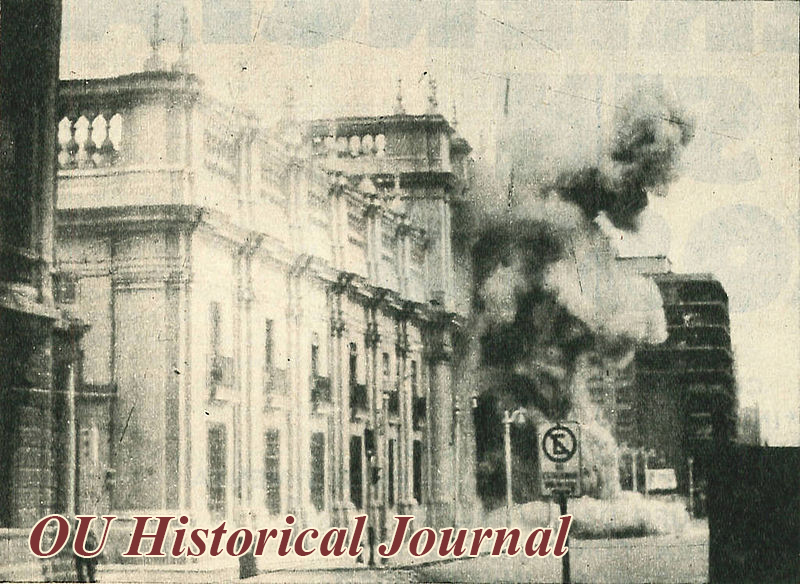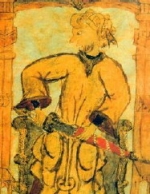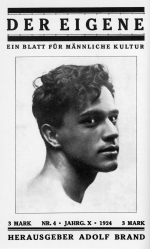Nicholas Eckenrode, “So That Others May Live, The Struggle of Jewish Doctors to Preserve Life in the Holocaust.” The Holocaust is at once a frequent subject of collegiate study and an infinitely multi-layered moment in history. In this paper, Nicholas Eckenrode succeeds in analyzing an element of Holocaust history whose obscurity has led most historians to miss its vital importance: the experiences of Jewish doctors caught up in the machinery of the Final Solution, desperately attempting to “preserve life” while surrounded by violent death. He addresses doctors’ roles in the ghettoes, their place inside and outside the hospitals of the death camps, and their roles as unwilling participants in Nazi science. This analysis demonstrates the technical and narrative breadth of historical writing, evoking human beings, human ideals, and their ability to endure in the direst of situations. –Arthur Dixon (Paper Written for Professor Janet Ward)

Issue 4, Spring 2015
Undergraduate Editors
Sarah Capps, Adriana Collins, Arthur Dixon, Morgan McCullough, Sarah Miles, Terrence Robertson, Monique Rodríguez, Richard Romines, Austin Scheller
Faculty Advisors
Raphael Folsom, Robert Griswold, Garret Olberding
Introduction
This year has marked new highs of participation and interest in the OU Historical Journal. Of the forty-five professors and affiliated faculty in the history department, thirty-seven nominated and voted to elect members of the editorial board. From the more than ninety nominees, the faculty selected four new student editors, joining the five who returned from last year’s board. All the nominees to the editorial board were contacted and asked to send in papers for the board’s consideration. We received forty-five submissions, more than we’ve ever had before. Accordingly, this is the largest issue we have ever published, with an expanded list of shorter works and honorable mentions.
The quality and diversity of the papers, not to mention the large number submitted, made the selection process intensely difficult. But after much hard work, the editorial board has arrived at a decision. The winner of the Griswold Prize for Excellence in Undergraduate Historical Scholarship is “Heterogeneous Exiliados,” by Arthur Dixon. This sterling piece of scholarship has three marks of distinction: precise and wide-ranging research, thoughtful analysis, and polished writing. The result is an essay that sparkles like a cut diamond.
There are many gems here, some a fraction of a carat lighter in research than Dixon’s, some slightly rougher in cut, but all beautiful, and all valuable. A wise writer once said that a great library is like Fort Knox, “except that at fort Knox gold is merely a symbol of wealth,” whereas, at the library, “the treasure is real.” Below is a collection of the jewels forged in the workshops of the history department.*
Winner of the Griswold Prize
Arthur Dixon’s “Heterogeneous Exiliados, Permanent Exilios, and Imagined Patrias: Modern Exile from Argentina and Chile” sheds new light on a subject well known to scholars of Latin America. His detailed analysis demonstrates the ways in which Argentine and Chilean exiles in the 20th century were different from those of earlier times. Theirs was a uniquely modern form of exile. Dixon tracks patterns in a complex historical period, noting differences between Argentine and Chilean exiles while maintaining a cohesive narrative throughout. Dixon’s eloquent analysis of a challenging topic marks his work as the best among many outstanding submissions. –Sarah Miles (Paper Written for Professor James Cane Carrasco)
Featured Articles
“A Satisfying Death, Eighteenth Century Creek Spiritual Traditions,” by Margaretta Gabriela Báez, is above all a fascinating story. I found this paper compelling in part because I am a history major focusing on American and Native American history, and in part because its focus on the custom of “Blood Law” has played a role in my family’s past. Some of my Cherokee ancestors (The Boudinot/Ridge faction) were executed on the grounds of “Blood Law” for signing away what remained of our ancestral homelands in North Georgia in the illegal treaty of New Echota in 1835. They signed it without the consent of the Cherokee people, and without the consent of Principal Chief John Ross, who later ordered their execution. This paper reminded me of the fracturing of my Cherokee people, and all other Native tribes, due to white encroachment, treaty-breaking, violence, and outright deceit. –Terrence Robertson (Paper Written for Professor Josh Piker)

Illustration by Edel Rodriguez

Tariq ibn Ziyad<br> Image from Wikimedia Commons
Kiley Foster’s paper, “A Legend in the Making: The Evolution of the Conquest Accounts of Al-Andalus,” on the conquest accounts of Al-Andalus is well constructed, consistently interesting, and unique vis-à-vis the other articles we publish here. It is unique because of its subject and the approach she took in examining it. While Foster provides sufficient historical context to the reader, and a general story, what makes her article interesting is her analysis of the minute details of the primary sources, her placement of those details in historical context, and the way she maps the evolution of accounts of the conquest. While Foster maintains a consistent focus, her article also presents the reader with historiography, context, and a brief introduction to the sources. This is important because most readers have no background in the Muslim conquest of Al-Andalus. This must have taken Ms. Foster an incredible amount of time and shows her command of the methods of history. -Richard Blake Romines (Paper Written for Professor Noam Stillman)

‘Der Eigene’ <br>From Google Images.
In "The Enduring Persecution of Queerness in Germany from Hitler to Adenauer," Parker Manek etches a disturbing picture of the 20th-century landscape in which gay Germans lived and died. Manek explains how the disasters and political drama of these years first opened a space for queer life to flourish, and then slammed that space shut with often-rabid violence. He writes with an admirably philosophical style, analyzing the community of victims into various categories and identifying fascinating exceptions, intersections, and ironies. Manek also takes the time to reflect thoughtfully on how gay individuals have, or have not, added to the chorus of the voices of Holocaust survivors, and what it means for them to return in this way to that inhuman era. –Austin Scheller (Paper Written for Professor Janet Ward)

Toddy jug with portrait<br>of George Washington
“The Lie in The Teapot: China, China Export Porcelain, and the Construction of Orientalism during the American Republic,” by Kiersten Strachan is an original and provocative contribution to our understanding of early American culture. Strachan has navigated the difficulties of transnational and comparative scholarship by drawing upon material culture. By using physical objects to help make her argument, Strachan explores a type of primary source that many historians do not draw upon. As she considers these ceramics, she participates in a critical discussion about orientalism and the way trade, travel, and racial stereotypes influence one another. Additionally, we have all seen the pottery that her essay discusses, because chinaware is still a major part of American culture in some regions of the United States. Strachan's essay critically examines the origins and consequences of this cultural borrowing and forces us to do the same. – Sarah Capps (Paper Written for Professor Cathy Kelly)
Shorter Works
In light of the quantity of excellent submissions we received this year, we include more short pieces than we have in the past. Winning submissions provide examples of excellent research and eloquent writing in the various short forms OU history papers take. Vieth’s essay on the relationship of science, the state, and religion in the 16th century, Koch’s essay on America’s failure to plan for its own energy future, and Ranger’s essay on the multifaceted nature of Sephardi identities in the Ottoman Empire demonstrate the broad range of topics our authors have tackled. Likewise, Miles’ paper on the influence of Henry IV of France’s religious belief on his rule, and Otis’s analysis of the deterioration of Sino-Korean relations during the Ming-Qing dynastic transition, demonstrate the variety of subjects OU history majors explore. Bringing together diverse experiences and unique research topics, these authors created meaningful essays asserting more limited, yet no less important, arguments than the longer papers we publish here. -Sarah Miles
Martin Koch. "Stumbling in the Dark: How America Fumbled its Energy Future.” (Paper Written for Professor Robert Lifset)
Sarah Miles. "Henry IV: Faith’s Power in Politics." (Paper Written for Professor Jane Wickersham)
Franklin Otis. "Sino-Korean Relations and the Ming-Qing Transition." (Paper Written for Professor Miriam Gross)
Shelby Ranger. "Sephardi Identity in Greater Syria in the Late Ottoman Period.” (Paper Written for Professor Gershon Lewental)
Paul Vieth. "At the Intersection of Natural, Theological, & Political Practice in 16th Century Northern Europe: Tycho Brahe’s & Philipp Melanchthon’s Astrological Adventures." (Paper Written for Professor Jane Wickersham)
Honorable Mention
We include a larger number of honorable mentions than we have before simply because we had more excellent submissions than in previous years. Each of these papers had its champion on the editorial board—one or more editors who thought they deserved a spot among the top six papers we received, or even the top spot. We include them to demonstrate the range of interests and tastes represented on the editorial board, and the kaleidoscopic variety of topics OU history students pursue in their work. –The Editors
Brittany Christensen. "Mussolini the Revolutionary: The March on Rome" (Paper Written for Professor Robert Griswold)
Adriana Collins. "Victoria’s Real Secret: Male Masculinity" (Paper Written for Professor Judith Lewis)
Paighten Harkins. “Night of Broken Glass Remembered: Now the New York Times Reported Kristallnacht in a Historical Context." (Paper Written for Professor Janet Ward)
Laura Kincaide. "Religion and Resistance: An Analysis on the Influence of Christianity on the White Rose Resistance Movement" (Paper Written for Professor Janet Ward)
Morgan McCullough. "Federalists, Songs, and the Populist Ratification of the Constitution" (Paper Written for Professor Paul Gilje)
Blake Romines. “Out of the Ashes: African American Responses to the Second Italo-Ethiopian War"(Paper Written for Professor Robert Griswold)
William Stringer. "Much to lose by Revolution: Nothing to Dread from Reform: Education Reform as a Means of Class Alliance in Victorian England" (Paper Written for Professor Judy Lewis)
* A note on the selection of these papers: Because our student editors are among the best students we have, the faculty advisors of the journal asked them to submit their papers under pseudonyms, such that the editorial board as a whole could consider their work in an unbiased way. Each of the submissions to the journal was read by all the editors, who selected their top ten papers. A number one vote was assigned ten points, and a number ten vote was assigned one point. The points were then aggregated, and the top vote-recipients were selected for publication. The criteria the papers were judged by can be found here.

